Does Islamic State ideology threaten Indonesia?
- Published
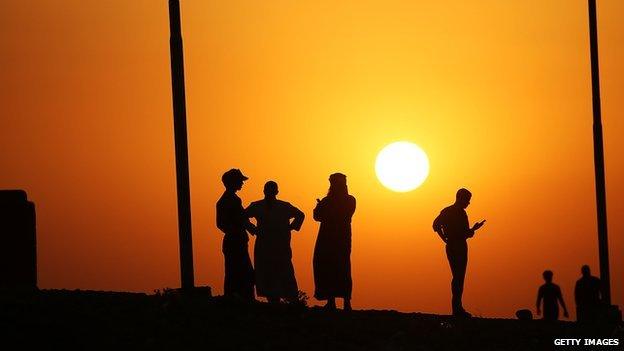
Government officials fear young Indonesians are being seduced by radical ideology
Jihadist fighters from the Islamic State militant group are swallowing up territory in Iraq and Syria. Officials fear the group is now trying to make ideological inroads in Indonesia, the world's largest Muslim nation.
Meetings of radical Indonesian groups declaring their support for the Islamic State (IS, also called Isis) have been held in Jakarta, Solo in Central Java and Bima in West Nusa Tenggara.
Most of these meetings are accompanied by public marches of young men and women carrying the IS flag through towns and villages, shouting out slogans.
Last week a video emerged on YouTube of young Indonesian men dressed in IS garb, presumably in Syria, encouraging their countrymen to join the cause.
The main protagonist in the video is believed to be Abu Muhammad - a fugitive wanted by Indonesian police on suspicion of terrorism offences.
In 60 seconds: What does Islamic State want?
The unverified video has sparked major concerns in government circles.
Indonesia has fought a tough battle against extremist groups in the last decade - a fight that is considered to have been fairly successful.
Militant networks have been dismantled and Abu Bakar Ba'asyir, thought to be the spiritual leader of Jemaah Islamiah - the group blamed for the Bali bombings, is in prison. But last month he declared support for IS from jail.
A resurgence in the kind of radical groups that backed Ba'asyir would be a worrying reversal.
More monitoring
Earlier this month, Indonesia responded by banning IS ideology in the archipelago.
"Isis's ideology is against Pancasila, the defining principle of Indonesia's pluralistic and multicultural society," said Djoko Suyanto, Indonesia's political, legal and security affairs minster.
"We want to make sure that Indonesia is not a country where you can spread ideas about Isis or an Islamic state."
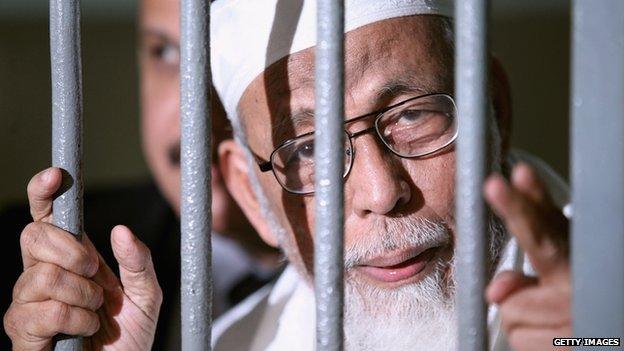
Jailed Muslim cleric Abu Bakar Ba'asyir has declared his support for IS
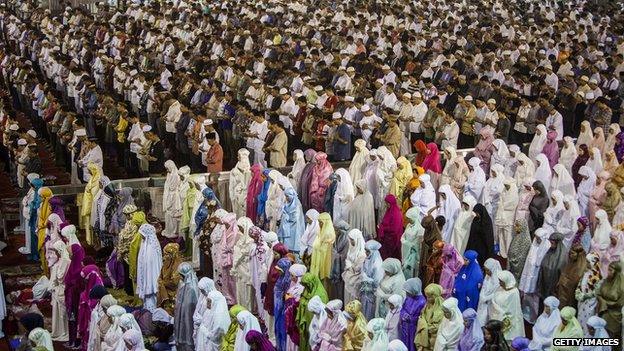
Indonesia is the world's largest Muslim nation
The government says it will block websites with IS content and monitor Indonesian citizens' plans to travel to conflict zones like the Middle East and South Asia to ensure they are not joining IS fighters.
Indonesia's anti-terror agency believes as many as 30 Indonesians have gone overseas to fight for the radical organisation.
Officials say they are considering revoking the citizenship of Indonesians who pledge support for the group.
But these measures do not appear to have affected IS's appeal in the eyes of some Indonesian Muslims, who have continued to express their support for the banned group.
In Solo cleric Afif Abdul Majid, who claims he recently returned from fighting for Isis in Syria, says he is not afraid of losing his citizenship.
"If we cannot build an Islamic state in Indonesia and there is an Islamic state in another country then we have to support that," he told the BBC.
"We support the Islamic state because it is what Allah has commanded," said Majid, who is a founder of hard-line group Jamaah Anshorut Tauhid (JAT).
'We don't want them'
But while IS may have its appeal among such hard-line groups, moderate Indonesian Muslims are rejecting its ideology.
"What IS do is not the way of Islam, which teaches peace and rejects violence, and it's not fit for Islam in Indonesia, which respects pluralism," said Din Syamsudin, chairman of the Indonesia Ulema Council.
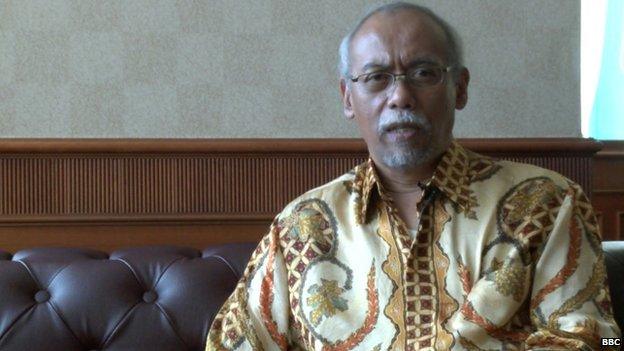
Harry Purwanto says legal remedies are needed to tackle the spread of radical ideology
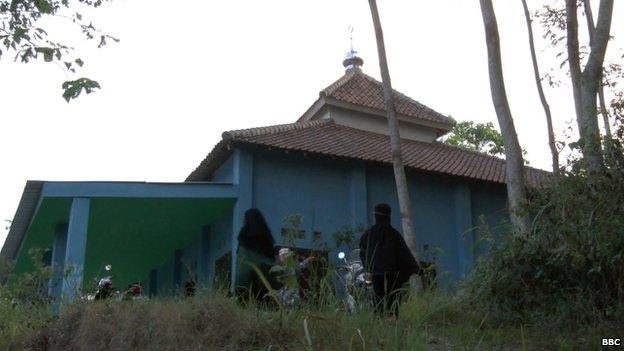
IS supporters held a meeting at this mosque in Malang
Last month in Malang, East Java, the local community stood up to a group trying to declare support for IS and refused to allow them into their mosques.
"They don't have permission from the police or us to gather in our mosque," said Syafiudin, a caretaker at the mosque.
"Plus we know IS is a radical hard-line group. We don't want them here."
The government is also concerned, however, about the potential effect of young Indonesians returning from fighting in Iraq and Syria.
"Our worry is about the men who have gone to fight in Iraq and Syria and who have now come back," Harry Purwanto of Indonesia's anti-terror force said.
"When they come back, will they carry out or try to plan a terror attack?"
At the moment, officials say, Indonesia's laws do not prevent groups like this from recruiting new converts or spreading their thinking.
"We have to change the law, otherwise we are powerless," said Mr Purwanto. "We cannot prevent the spreading of this radical ideology - especially amongst young people."
- Published16 June 2014
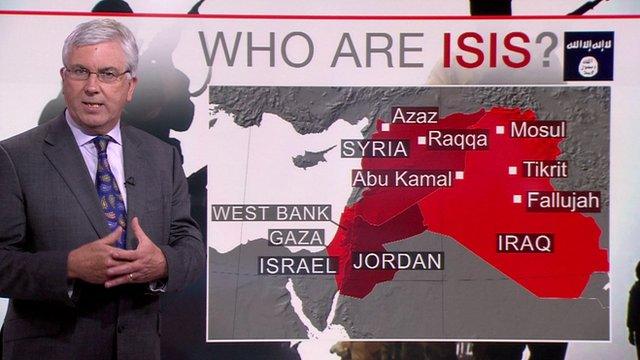
- Published14 July 2014
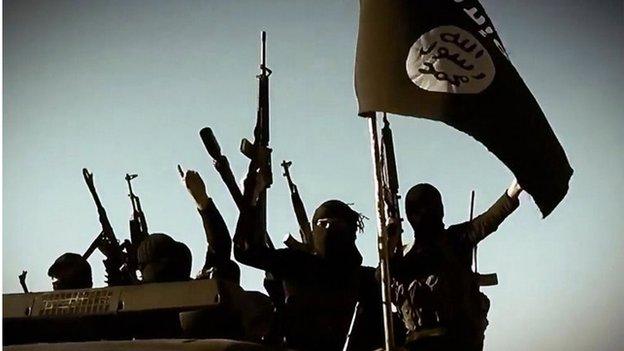
- Published2 August 2014
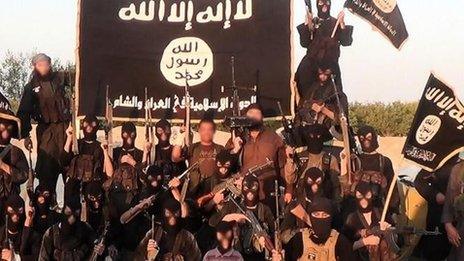
- Published11 July 2014
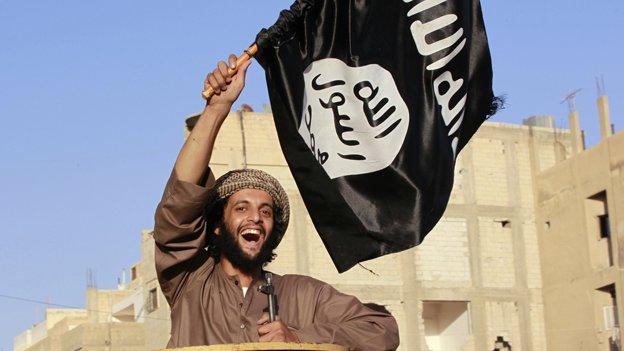
- Published23 September 2014
